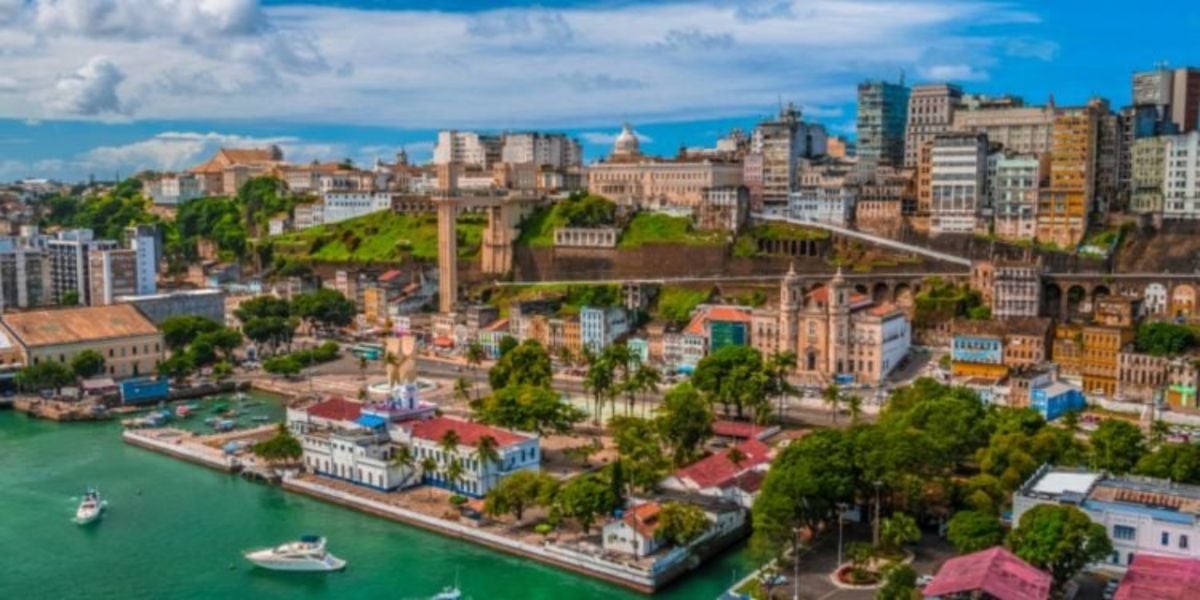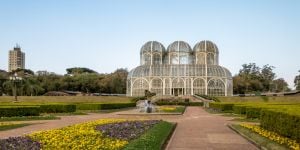
Salvador, the capital of the state of Bahia and Brazil's first colonial capital, is a world-known tourist destination. Located in the northeast of the country on the South Atlantic coast, it's very popular, thanks to its beautiful sand beaches, its colonial architecture, and its preservation of African traditions, which are apparent in its distinctive food, clothing, religions, and music. Salvador today is a large city of three million, in a virtual tie with Brasilia for status as the third-largest city in Brazil. Before beginning your search for accommodation in Salvador de Bahia, first read Expat.com's Accommodation in Brazil section.
Living in Salvador de Bahia
Salvador is interesting historically and architecturally. While rooted firmly in the earliest history of the country, Salvador today is also a city of skyscrapers and software companies.
Salvador is also known for its fabulous white-sand beaches, although the best are actually about an hour north of the city proper. The weather is warm to hot throughout the year. Rainfall varies, being heavier between May and July.
Each year, Salvador hosts a massive Carnival, different in style to that of Rio's. Huge trucks called trios crawl through the streets, blasting music at the crowds thronging the streets.
A drawback to Salvador is that it's considered to be one of the most dangerous cities in Brazil, with a high incidence of homicides. “Good” and “bad” neighborhoods are often juxtaposed, so choosing an area in which to live isn't always straightforward. The advice of locals should be sought.
Neighborhoods in Salvador
Safety should be a prime consideration when selecting a place to live. Do your homework before finalizing your decision. Also, note that traffic congestion is a common problem in Salvador. Therefore, if possible, try to find a place to live near your place of employment.
Salvador is located on a peninsula that points down to the south. Many of the more desirable neighborhoods are clustered near the southern tip of the peninsula. Avoid the northwestern sector of the city, which is dangerous. Some of the more well-to-do neighborhoods include Pituba, Horto Florestal, Itaigara, Costa Azul, Corredor da Vitória, Graça, AlphaVille, GreenVille, Barra, Caminho das Ãrvores, Loteamento Aquárius, Brotas, Stiep, Armação, Jaguaribe, and Stella Maris.
Although Salvador is an old city, many residences in these areas are newer, high-rise apartment buildings. These buildings provide 24-hour security and often amenities such as a gym or pool.
For short-term or vacation visits, consider staying either in the Centro Historico (Pelourinho and Santo Antônio) or somewhere by the beach (Barra or Rio Vermelho). Pelourinho offers lots of history and architecture, and also a boisterous nightlife. Barra is near the beach, which will appeal to many. Rio Vermelho has a local feel, with lots of small cafés and bars with live music.
For more in-depth information on some of the better neighborhoods to live in, keep reading.
Pelourinho
As we've just said, Pelourinho is in the Centro Historico. It's actually a UNESCO World Heritage Site, thanks to its vibrant and colorful energy. Here, you'll hear live music like samba-reggae, and you'll definitely see plenty of colorful people. This, in addition to its many cheap hostels, draws a lot of backpackers in.
Despite it being so vibrant here, Pelourinho doesn't have much of a nightlife after 10:00 pm. The exceptions are Carnaval and Sao João.
If you're looking for a cheap and safe neighborhood to live in, then Pelourinho might be it. It's one of the cheapest neighborhoods in Salvador.
Santo Antônio
Right next to Pelourinho is Santo Antônio. This neighborhood has small and colorful architecture throughout, so if you like whimsical things, you'll feel right at home here. This neighborhood is also ideal if you want to spend a lot of time in Pelourinho but don't want to live there.
The downside to settling in Santo Antônio is there's no beach here. But considering that you're so close to Pelourinho, it's worth it. Plus, if you live on the western side of the main street, you'll be able to see a stunning view of the Bahia dos Todos Santos bay.
In this moderately-priced neighborhood, you can stay in pousadas, private apartments, and hostels.
Vitória
If you want to live somewhere near Pelourinho but you desire a neighborhood that's both green and quiet, then choose Vitória. It's a great place to lead a peaceful life while being in close proximity to the Centro Historico.
Vitória also has some interesting landmarks. They include Campo Grande Square and the Castro Alves Theater.
Barra
Barra is at the very tip of the Salvador peninsula, which means you'll enjoy some fantastic beaches. And you'll never get tired of the breathtaking views you'll get from the sunsets. But more importantly, it's one of the safest neighborhoods around. You'll see lots of police patrolling the area, so you'll always feel safe.
Here, you'll find both pousadas (aparthotels) and private apartments for rent, which makes it a great area for people who are new to Brazil. Not only that, but there are lots of grocery stores and restaurants, and is generally a tourist-friendly neighborhood.
It's not far away from Pelourinho, so if you want to explore, or you want to show off the local area to any loved ones who are visiting, all you have to do is hop in a taxi or bus to get there.
Another thing to note is there are many language schools in the Barra neighborhood. This can come in handy if you need to learn Portuguese or any other language.
If you're into the partying lifestyle, then look elsewhere, as Barra's not the place to be for that.
Itapuã
If you don't want to be close to the action in Pelourinho, then Itapuã is the neighborhood to pick. It's far away and there's no easy access to Pelourinho here.
This suburb is clean and quiet, and it still has plenty of beautiful beaches to enjoy. This mid-priced neighborhood has pousadas, hotels, and private apartments to rent.
Foodies will enjoy being in Itapuã since there are many clean and high-quality restaurants. In addition to restaurants, Itapuã has lots of music venues. Therefore, this neighborhood offers decent nightlife, but not in terms of wild parties.
Rio Vermelho
Rio Vermelho has a reputation for being a bohemian neighborhood, but it probably won't be what you envision in your mind. It's actually an upper-middle class neighborhood, but it has lots of nightlife for you to enjoy.
Those who like to party the night away will find the numerous nightclubs in Rio Vermelho amazing, especially since you don't have to go far to go home. Otherwise, music lovers will also love this neighborhood, as there are many live music venues too. Not to mention, Rio Vermelho is home to lots of nice restaurants, so the foodies have something here too. And this neighborhood has access to beaches. You can stay in hotels and private apartments here.
Of course, all of this comes at a price. Rio Vermelho is the most expensive neighborhood to live in. But if you come from a country that has a high cost of living, it'll still be relatively inexpensive to make a home in this neighborhood.
Accommodation prices
Rental prices are lower in Salvador than in many other large cities in Brazil, such as Rio and Sao Paulo. Even in the nicer areas listed above, it's possible to find many furnished one-bedroom apartments in modern, secure high-rises for under R$1,500 (Brazilian reals), plus condominium fees and taxes. While condominium fees are high in relation to rent prices, it's still possible to find very nice furnished units in buildings with amenities for around R$2,000 (fees and taxes included). Many nice three-bedroom units are available in the range of R$2,500 to R$4,000, plus fees.
It's also cheaper to buy property in Salvador than in other major cities in Brazil. To buy a home in one of the nicer areas, expect to pay around R$9,400 per square meter, although in the current down market, you should negotiate firmly. In an outlying area, you'll pay significantly less, perhaps R$5,600 per square meter.
The rental process
Like most other countries, you'll take a look at listings and then book a viewing if you find a property you like. You'll do this either through a landlord or a real estate agency. Either way, you'll want to carefully inspect the property so you're not in for any surprises during your stay.
Considering that accommodations can be difficult to find in Brazil, you should snatch up any prime opportunities when you can. Ideally, if you like the property after viewing it, you should inform the landlord or agent right away that you want to rent it.
The lease
In Brazil, the normal lease term is around 30 months, between two and three years. But understandably, you may not want to be locked into such a long rental contract. The good news is, in areas with more expats, you'll be able to find contracts of 12 months or even lower. For these, it'll still say a 30-month lease, but the landlord or agent will add a clause that says you can leave after 12 months without any consequences.
Usually, you'll need a fiador or co-signer to get a lease, and these people must meet certain requirements. Some landlords even require two in some cases. Considering you're new to the country, it's not likely you'll know one person to be your fiador, let alone two. But thankfully, not all hope is lost here. Instead of having a fiador, you can give them a higher deposit. You can also show that you have a strong work history.
Before you sign the lease, you might be able to negotiate the rent price. This is especially true if you're working with a private landlord; it may not be as easy to haggle the price with a rental agency, but it's possible sometimes, so give it a try, as it wouldn't hurt to do so.
When you've reached terms you're happy with, it's time to sign the lease. You'll need to have a Cadastro de Pessoas Fisicas (CPF), which is a Brazilian Identity Card. It can take a few months to get after applying for one, so it's best if you start the process as soon as you get to Brazil. Otherwise, you'll have to stay in short-term accommodation until you receive your CPF.
The rental contract is called the Contrato de Locação de Imóvel. This needs to be signed by both you and the landlord. The contract will be in Portuguese, so if you don't have a good grasp of the language, you'll want to have it translated before you sign it. You can have a friend or colleague do this for you, or you can also hire a professional translator/interpreter if you don't have anyone you can rely on.
If you're signing a rental contract while out of Brazil, then you'll have to have it notarized. Not only that, but it needs to be notarized in Brazil, as foreign notarizations aren't accepted.
The deposit
Most landlords and rental agencies will ask for between one to three months' rent when it comes to the deposit. If you feel uneasy about this, then have peace of mind knowing that they're legally required to keep tenants' deposits in a separate savings account that's not their personal one. Even better is, if that amount earns any interest, then they have to give that extra money to you, regardless of how much of your deposit you get back.
For those staying in a short-term rental property, you won't have to make a deposit. You'll be free to pay from month to month until you find another more long-term solution.
In the case that you're signing from outside of Brazil, you should note that the landlord can ask you for a 50% down payment based on how long you're staying in the property. For example, if you're signing for 12 months, they can ask for six months' rent upfront. By law, they're allowed to ask their tenants for one form of guarantee. It can be either a large deposit like this or that you have a fiador.
Useful links:
We do our best to provide accurate and up to date information. However, if you have noticed any inaccuracies in this article, please let us know in the comments section below.








